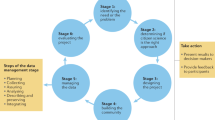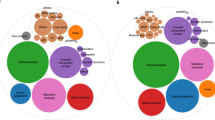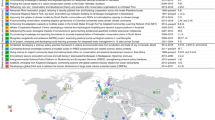Abstract
Socio–environmental synthesis as a research approach contributes to broader sustainability policy and practice by reusing data from disparate disciplines in innovative ways. Synthesizing diverse data sources and types of evidence can help to better conceptualize, investigate and address increasingly complex socio–environmental problems. However, sharing qualitative data for re-use remains uncommon when compared to sharing quantitative data. We argue that qualitative data present untapped opportunities for sustainability science, and discuss practical pathways to facilitate and realize the benefits from sharing and reusing qualitative data. However, these opportunities and benefits are also hindered by practical, ethical and epistemological challenges. To address these challenges and accelerate qualitative data sharing, we outline enabling conditions and suggest actions for researchers, institutions, funders, data repository managers and publishers.
This is a preview of subscription content, access via your institution
Access options
Access Nature and 54 other Nature Portfolio journals
Get Nature+, our best-value online-access subscription
$29.99 / 30 days
cancel any time
Subscribe to this journal
Receive 12 digital issues and online access to articles
$119.00 per year
only $9.92 per issue
Buy this article
- Purchase on Springer Link
- Instant access to full article PDF
Prices may be subject to local taxes which are calculated during checkout

image courtesy of Sofia Jain-Schlaepfer, www.wiseart.net.
Similar content being viewed by others
References
Palmer, M. A. et al. Ecological science and sustainability for the 21st century. Front. Ecol. Environ. 3, 4–11 (2005).
Hampton, S. E. et al. Big data and the future of ecology. Front. Ecol. Environ. 11, 156–162 (2013).
Romulo, C. L. et al. Global state and potential scope of investments in watershed services for large cities. Nat. Commun. 9, 4375 (2018).
Siegel, K. J. et al. Sovereign states in the Caribbean have lower social-ecological vulnerability to coral bleaching than overseas territories. Proc. R. Soc. B 286, 20182365 (2019).
Rodrigo, A. et al. Science incubators: synthesis centers and their role in the research ecosystem. PLoS Biol. 11, e1001468 (2013).
Palmer, M. A., Kramer, J. G., Boyd, J. & Hawthorne, D. Practices for facilitating interdisciplinary synthetic research: the National Socio-Environmental Synthesis Center (SESYNC). Curr. Opin. Environ. Sustain. 19, 111–122 (2016).
Goodwin, J. & Horowitz, R. Introduction: the methodological strengths and dilemmas of qualitative sociology. Qual. Sociol. 25, 33–47 (2002).
Hicks, C. C. et al. Engage key social concepts for sustainability: social indicators, both mature and emerging, are underused. Science 352, 38–40 (2016).
Bennett, N. J. et al. Conservation social science: understanding and integrating human dimensions to improve conservation. Biol. Conserv. 205, 93–108 (2017).
Moon, K. et al. Expanding the role of social science in conservation through an engagement with philosophy, methodology, and methods. Methods Ecol. Evol. 10, 294–302 (2019).
Narayan, D. Voices of the Poor: Can Anyone Hear Us? (Oxford Univ. Press, World Bank, 2000).
Narayan, D., Chambers, R., Shah, M. K. & Petesch, P. Voices of the Poor: Crying out for Change (Oxford Univ. Press, World Bank, 2000).
Narayan, D. & Petesch, P. (eds) Voices of the Poor: From Many Lands (Oxford Univ. Press, World Bank, 2002).
Moon, K., Brewer, T. D., Januchowski-Hartley, S. R., Adams, V. M. & Blackman, D. A. A guideline to improve qualitative social science publishing in ecology and conservation journals. Ecol. Soc. 21, 17 (2016).
Cox, M. A basic guide for empirical environmental social science. Ecol. Soc. 20, 63 (2015).
Kukutai, T. & Taylor, J. (eds) Indigenous Data Sovereignty: Toward an Agenda Vol. 38 (ANU Press, 2016).
Hess, C. & Ostrom, E. in Understanding Knowledge as a Commons: From Theory to Practice (eds Hess, C. & Ostrom, E.) 3–26 (MIT Press, 2011).
Osmond, B. et al. Changing the way we think about global change research: scaling up in experimental ecosystem science. Glob. Change Biol. 10, 393–407 (2004).
Riedlinger, D. & Berkes, F. Contributions of traditional knowledge to understanding climate change in the Canadian Arctic. Polar Rec. 37, 315–328 (2001).
Cook, C. N. & Hockings, M. Opportunities for improving the rigor of management effectiveness evaluations in protected areas. Conserv. Lett. 4, 372–382 (2011).
Fielding, N. G. Triangulation and mixed methods designs: data integration with new research technologies. J. Mixed Methods Res. 6, 124–136 (2012).
Peek, L., Fothergill, A., Pardee, J. W. & Weber, L. Studying displacement: new networks, lessons learned. Sociol. Inq. 84, 354–359 (2014).
McClenachan, L. Documenting loss of large trophy fish from the Florida Keys with historical photographs. Conserv. Biol. 23, 636–643 (2009).
Poteete, A. & Ostrom, E. Bridging the qualitative-quantitative divide: strategies for building large-N databases based on qualitative research. In 101st Annual Meeting of the American Political Science Association W05I-27, 1–53 (American Political Science Association, 2005); http://hdl.handle.net/10535/5890
Magliocca, N. R. et al. Closing global knowledge gaps: producing generalized knowledge from case studies of social-ecological systems. Glob. Environ. Change 50, 1–14 (2018).
Janssen, M. A. & Ostrom, E. Empirically based, agent-based models. Ecol. Soc. 11, 37 (2006).
Charnley, S. et al. Evaluating the best available social science for natural resource management decision-making. Environ. Sci. Policy 73, 80–88 (2017).
Game, E. T. et al. Cross-discipline evidence principles for sustainability policy. Nat. Sustain. 1, 452–454 (2018).
Bennett, N. J. Using perceptions as evidence to improve conservation and environmental management. Conserv. Biol. 30, 582–592 (2016).
Wyborn, C. & Bixler, R. P. Collaboration and nested environmental governance: scale dependence, scale framing, and cross-scale interactions in collaborative conservation. J. Environ. Manag. 123, 58–67 (2013).
Cash, D. W. et al. Scale and cross-scale dynamics: governance and information in a multilevel world. Ecol. Soc. 11, 8 (2006).
Ban, N. C. et al. Social and ecological effectiveness of large marine protected areas. Glob. Environ. Change 43, 82–91 (2017).
Lindkvist, E., Basurto, X. & Schlüter, M. Micro-level explanations for emergent patterns of self-governance arrangements in small-scale fisheries—a modeling approach. PloS ONE 12, e0175532 (2017).
Gill, D. A. et al. Capacity shortfalls hinder the performance of marine protected areas globally. Nature 543, 665–671 (2017).
Biedenweg, K., Harguth, H. & Stiles, K. The science and politics of human well-being: a case study in cocreating indicators for Puget Sound restoration. Ecol. Soc. 22, 11 (2018).
Hartter, J., Ryan, S. J., MacKenzie, C. A., Parker, J. N. & Strasser, C. A. Spatially explicit data: stewardship and ethical challenges in science. PLoS Biol. 11, e1001634 (2013).
Fernández-Llamazares, Á. & Cabeza, M. Rediscovering the potential of indigenous storytelling for conservation practice. Conserv. Lett. 11, e12398 (2017).
Tengö, M., Brondizio, E. S., Elmqvist, T., Malmer, P. & Spierenburg, M. Connecting diverse knowledge systems for enhanced ecosystem governance: the multiple evidence base approach. Ambio 43, 579–591 (2014).
Maxwell, J. A. in Epistemologies for Qualitative Research (eds Soini, H., Kronqvist, E.-L. & Huber, G. L.) 10–27 (Center for Qualitative Psychology, 2011).
Hammersley, M. Qualitative data archiving: some reflections on its prospects and problems. Sociology 31, 131–142 (1997).
Denzin, N. K. & Lincoln, Y. S. The Landscape of Qualitative Research (Sage, 2008).
Nightingale, A. J. Adaptive scholarship and situated knowledges? Hybrid methodologies and plural epistemologies in climate change adaptation research. Area 48, 41–47 (2016).
Mahajan, S. L. et al. Systems thinking for planning and evaluating conservation interventions. Conserv. Sci. Pract. 1, e44 (2019).
Reyes, V. Three models of transparency in ethnographic research: naming places, naming people, and sharing data. Ethnography 19, 204–226 (2018).
Broom, A., Cheshire, L. & Emmison, M. Qualitative researchers’ understandings of their practice and the implications for data archiving and sharing. Sociology 43, 1163–1180 (2009).
Barnett-Page, E. & Thomas, J. Methods for the synthesis of qualitative research: a critical review. BMC Med. Res. Methodol. 9, 59 (2009).
Hartsock, N. in The Socialist Feminist Project: A Contemporary Reader in Theory and Politics (ed. Holmstrom, N.) 350–359 (Monthly Review Press, 2002).
Lupia, A. & Elman, C. Openness in political science: data access and research transparency. PS Political Sci. Politics 47, 19–42 (2014).
DuBois, J. M., Strais, M. & Walsh, H. Is it time to share qualitative research data? Qual. Psych. 5, 380–393 (2018).
Bishop, L. Ethical sharing and re-use of qualitative data. Austral. J. Soc. Issues 44, 255–272 (2009).
Turner, D. Archiving qualitative data: will secondary analysis become the norm? Quirkos (24 November 2016); https://go.nature.com/32U7hH7
Statement of Principles and Practices for Arctic Data Management (International Arctic Science Committee, 2013); https://go.nature.com/32KBpEG
Bishop, L. & Kuula-Luumi, A. Revisiting qualitative data re-Use: a decade on. SAGE Open 7, 1–15 (2017).
Hoyle, L. et al. A qualitative data model for DDI Data Documentation Initiative Working Paper No. 5 (Data Documentation Alliance, 2013); https://go.nature.com/2MJGFmw
Wilkinson, M. D. et al. The FAIR Guiding Principles for scientific data management and stewardship. Sci. Data 3, 160018 (2016).
Schofield, P. N. et al. Post-publication sharing of data and tools. Nature 461, 171–173 (2009).
National Research Council On the Full and Open Exchange of Scientific Data (The National Academies Press, 1995); https://go.nature.com/32MBY0I
Jones, K. et al. Qualitative Data Sharing and Re-use for Socio-environmental Systems Research: A Synthesis of Opportunities, Challenges, Resources and Approaches SESYNC White Paper (SESYNC, 2018); https://doi.org/10.13016/M2WH2DG59
Savtchenko, A. et al. Terra and Aqua MODIS products available from NASA GES DAAC. Adv. Space Res. 34, 710–714 (2004).
Elman, C. & Kapiszewski, D. Data access and research transparency in the qualitative tradition. PS Political Sci. Politics 47, 43–47 (2014).
Collins, F. S., Morgan, M. & Patrinos, A. The Human Genome Project: lessons from large-scale biology. Science 300, 286–290 (2003).
Mannheimer, S., Pienta, A., Kirilova, D., Elman, C. & Wutich, A. Qualitative data sharing: data repositories and academic libraries as key partners in addressing challenges. Am. Behav. Sci. 63, 643–664 (2019).
Miguel, E. et al. Promoting transparency in social science research. Science 343, 30–31 (2014).
Lynch, C. How do your data grow? Nature 455, 28–29 (2008).
Karcher, S., Kirilova, D. & Weber, N. Beyond the matrix: repository services for qualitative data. IFLA J. 42, 292–302 (2016).
Kidwell, M. C. et al. Badges to acknowledge open practices: a simple, low-cost, effective method for increasing transparency. PLoS Biol. 14, e1002456 (2016).
Denzin, N. K. & Lincoln, Y. S. The Landscape of Qualitative Research (SAGE, 2008).
Corti, L. Recent development in archiving social research. Int. J. Soc. Res. Methodol. 15, 281–290 (2012).
Boulton, D. & Hammersley, M. in Data collection and Analysis 2nd edn (eds Sapsford, R. & Jupp, V.) Ch. 10 (SAGE Research Methods, 2006).
Moon, K. & Blackman, D. A guide to understanding social science research for natural scientists. Conserv. Biol. 28, 1167–1177 (2014).
Acknowledgements
S.M.A., K.J., R.D.H., N.M. and H.R. were supported by the National Socio-Environmental Synthesis Center (SESYNC) under funding received from the National Science Foundation DBI-1052875. S.M.A. was also supported by the Social Sciences and Humanities Research Council of Canada. S.K. and N.W. were supported, in part, by an Alfred P. Sloan Grant (2018-11217). J.A.S. was supported by funding from the National Science Foundation (BCS-1042888; BCS-0746528; BCS-1413999) and the National Aeronautics and Space Administration (NNX13AB72G).
Author information
Authors and Affiliations
Contributions
S.M.A. and K.J. designed and performed the research, led the collaborative work and the writing of the manuscript. All other authors contributed to the research, analysis and writing based upon their specific expertise, and they are listed alphabetically in the author list following N.J.B.
Corresponding authors
Ethics declarations
Competing interests
The authors declare no competing interests.
Additional information
Publisher’s note Springer Nature remains neutral with regard to jurisdictional claims in published maps and institutional affiliations.
Rights and permissions
About this article
Cite this article
Alexander, S.M., Jones, K., Bennett, N.J. et al. Qualitative data sharing and synthesis for sustainability science. Nat Sustain 3, 81–88 (2020). https://doi.org/10.1038/s41893-019-0434-8
Received:
Accepted:
Published:
Issue Date:
DOI: https://doi.org/10.1038/s41893-019-0434-8
This article is cited by
-
A vision for sustainable additive manufacturing
Nature Sustainability (2024)
-
Train axle temperature detection and communication design based on wireless sensor
International Journal of System Assurance Engineering and Management (2023)
-
Five social science intervention areas for ocean sustainability initiatives
npj Ocean Sustainability (2023)
-
Boosting geoscience data sharing in China
Nature Geoscience (2021)
-
The value of facilitation in interdisciplinary socio-environmental team research
Socio-Ecological Practice Research (2021)



